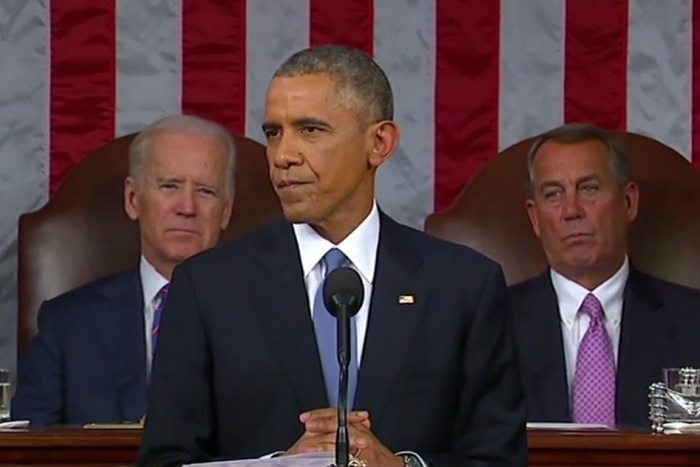In State of the Union Address, Obama Makes Strong Case for Women’s Economic Issues
“It’s time we stop treating child care as a side issue, or a women’s issue, and treat it like the national economic priority that it is for all of us,” Obama said Tuesday night.

President Obama’s State of the Union address to Congress made a forceful case for “middle-class economics,” equal pay, paid leave, and affordable child care as being “must-have,” not “nice-to-have,” necessities for families.
“It’s time we stop treating child care as a side issue, or a women’s issue, and treat it like the national economic priority that it is for all of us,” Obama said.
For a real-life example of why this is so, Obama pointed to Rebekah and Ben Erler of Minnesota, a couple who struggled when the housing and construction markets took a nosedive. Their child care, Obama noted, costs more than their mortgage and almost as much as a year of tuition at the University of Minnesota.
Obama called for creating more child care slots and a new tax cut of up to $3,000 per year. He said that the United States provided universal child care when having women in the workforce was a national security priority in World War II—and that given today’s economy, where two parents have to work to support a family, affordable and quality child care is more important than ever.
He highlighted the fact that America is the only advanced country on Earth not to guarantee paid maternity or sick leave to its workers, and that 43 million Americans have no paid sick leave.
The lack of access to paid sick leave is especially a problem for tipped employees working in restaurants and other service industries. These workers also experience higher poverty rates and are disproportionately women.
Obama recently expanded paid family and sick leave for federal workers and has urged Congress to do the same, although that outcome isn’t likely as long as Republicans have the majority in both houses.
The president called for free community college for two years and reiterated his veto threat if Congress tries to rescind his immigration order. He called on Congress to pass legislation advancing equal pay for women—“It’s 2015. It’s time,” he said—and for raising the minimum wage.
“If you truly believe you could work full-time and support a family on less than $15,000 a year, try it,” Obama said, to laughter in the chamber.
Many Republicans, including House Speaker John Boehner (R-OH), remained seated during standing ovations in the chamber at the passages on equal pay and minimum wage increases.
Republicans also remained seated after a line about the need to “restore the link between hard work and growing opportunity,” after Obama reminded Congress that this year was the strongest year for overall economic growth in more than a decade.
His ideas about “middle-class economics,” presumably a response to the conservative idea of “trickle-down economics,” focused on helping working families afford child care, college, health care, housing, and retirement, and doing these things at the expense of the “super-rich.”
Obama’s remarks on the need for “women’s issues” to be everyone’s issues echoed his speech at the first-ever White House Summit on Working Families last year, when he said that family leave, child care, workplace flexibility, and a decent wage “shouldn’t be bonuses.”
He put forth pro-government messages, which the Democratic Party is starting to get bolder about in general. He said the nation needs to “set our sights higher” and “do more than just do no harm” when it comes to government action.
The speech also marked the first time that the words “transgender,” “lesbian,” or “bisexual” were said in a State of the Union address.
The president’s comments about women’s health and abortion rights, however, were far more tepid than his defense of women’s need for economic security for their families.
“We still may not agree on a woman’s right to choose, but surely we can agree it’s a good thing that teen pregnancies and abortions are nearing all-time lows, and that every woman should have access to the health care she needs,” he said.

